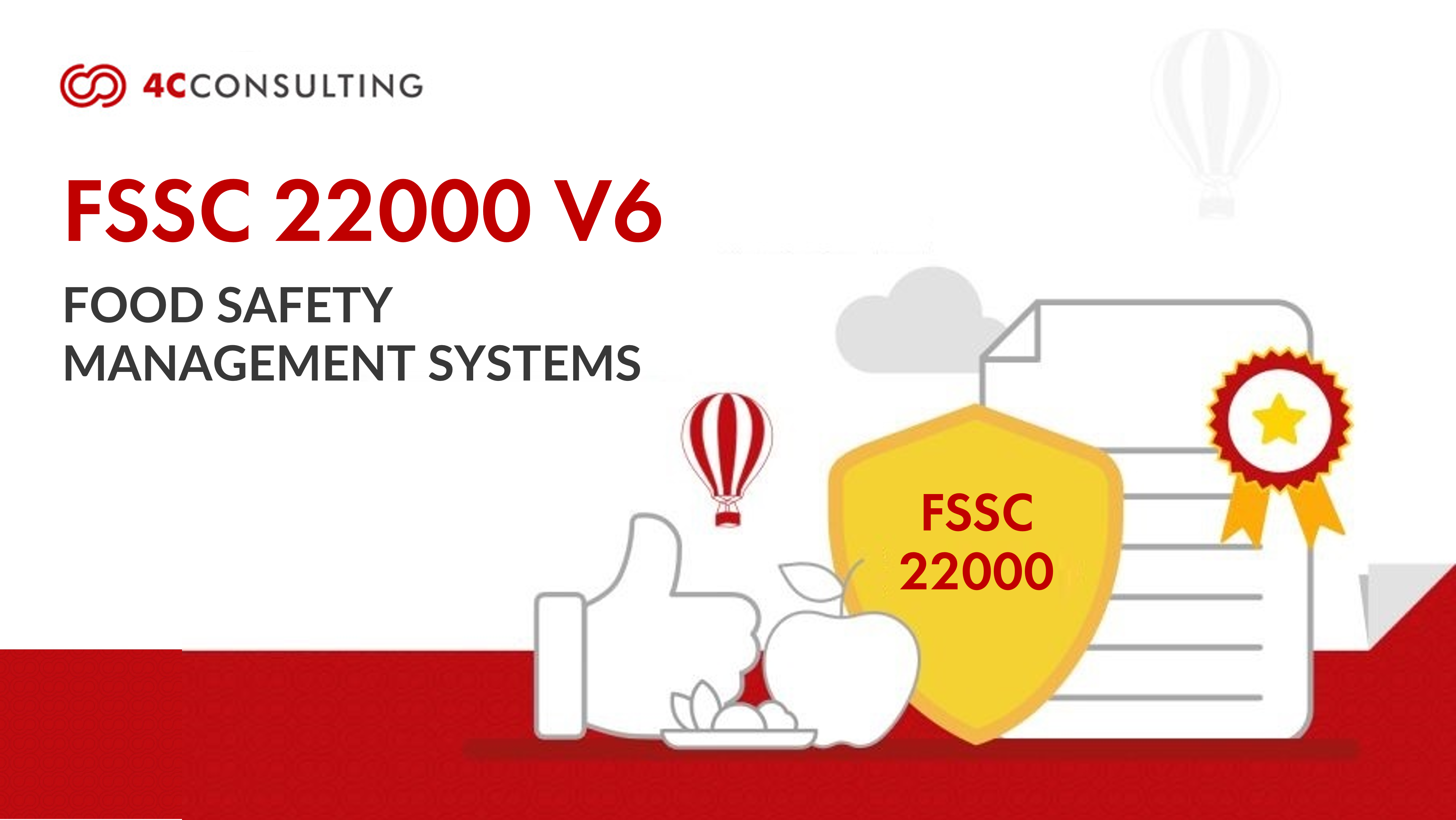
Upgrade Your Food Safety: Transition from FSSC 22000 5.1 to FSSC 22000 6.0
9th Feb, 2024
Every year, one in ten people get sick from unsafe food. It’s crucial for responsible food businesses to follow strong safety practices. Staying updated on the latest certifications is important, and the FSSC 22000 certification is especially significant. This blog post serves as a comprehensive guide for seamlessly transitioning from FSSC version 5.1 to the recently released version FSSC 6.0. Whether your operational sphere encompasses food manufacturing, processing, distribution, or retail, this resource addresses your specific requirements. By the conclusion of this guide, you will acquire an understanding of differences between the versions, have a well-defined implementation strategy, and be well-prepared to capitalize on the advantages offered by this enhanced standard.
.
Why Transition from FSSC 5.1 to FSSC 6.0 is Necessary?
Implementing the shift to FSSC 22000 standards from FSSC 5.1 to FSSC 6.0 holds a significant importance for food businesses. Here are some key reasons why:
- Enhanced Food Safety: FSSC 22000 provides a comprehensive framework for managing food safety hazards, ensuring the production of safe and quality food products. This robust system standard not only meets regulatory requirements but also fosters a proactive approach, identifying and mitigating potential risks throughout the entire food production process.
- Regulatory Compliance: By implementing FSSC 22000, businesses not only meet but exceed global food safety regulations, showcasing a commitment to the highest standards. This not only builds trust with customers and stakeholders but also positions the company as a reliable and responsible player in the food industry, fostering long-term relationships and loyalty.
- Market Competitiveness: FSSC 22000 certification Standards enhances a company’s reputation, making it more competitive in the market and opening doors to new business opportunities. Moreover, this recognition helps establish a positive image that attracts a broader customer base.
- Continuous Improvement: FSSC 22000 promotes a culture of continuous improvement, encouraging businesses to identify and address potential food safety risks, resulting in better operational efficiency. This strategic approach not only ensures ongoing compliance but also mitigates risks proactively, safeguarding against potential incidents.
- Consumer Trust and Confidence: Certification under FSSC 6.0 assures consumers that the certified organization has implemented robust food safety management systems. This transparency enhances consumer trust and confidence, a critical factor in today’s market where consumers prioritize the safety and quality of the products they consume.
.
Differences between FSSC 22000 5.1 and FSSC 22000 6.0:
The transition from FSSC 5.1 to FSSC 6.0 brings about several key differences in the certification. Some major differences include:
- Food Defense: Elevating Preparedness
- FSSC 5.1: Minimal requirements.
- FSSC 6: Raises the bar with explicit demands for vulnerability assessments and mitigation strategies. Notably, there’s a heightened emphasis on bolstering both physical and procedural controls, fortifying an organization’s defense against potential threats
- Requirements: Streamlining for Efficiency
- FSSC 5.1: Complex and potentially redundant.
- FSSC 6: Embraces a streamlined approach by consolidating requirements. This strategic move enhances clarity and operational efficiency, allowing organizations to navigate compliance more effectively.
- Sustainability Integration: A Progressive Leap
- FSSC 5.1: Silent on sustainability.
- FSSC 6: Embraces the future by introducing requirements for environmental management and responsible sourcing practices. This aligns food safety efforts with broader sustainability goals, reflecting a holistic approach to responsible business practices.
- Food Fraud Mitigation: Strengthening Defenses
- FSSC 5.1: Limited guidance.
- FSSC 6: Takes a leap forward with specific guidance on identifying and mitigating vulnerabilities. The emphasis on enhanced controls throughout the supply chain marks a significant stride in fortifying against potential food fraud risks.
- Risk-Based Approach: Prioritizing Safety
- FSSC 5.1: Encourages risk assessment without making it mandatory.
- FSSC 6: Mandates the identification and prioritization of significant food safety risks. This shift provides organizations with the flexibility to implement controls tailored to their unique risk profiles.
- Communication & Stakeholder Engagement: Amplifying Impact
- FSSC 5.1: Basic principles outlined.
- FSSC 6: Elevates the importance of communication, both internal and external. There’s a notable emphasis on stakeholder engagement and collaboration, recognizing the critical role communication plays in effective food safety management.
- Technology Adoption: Embracing the Digital Era
- FSSC 5.1: No specific mention.
- FSSC 6: Encourages the adoption of digital tools and technologies. Recognizing the benefits of data-driven decision-making, this strategic move positions organizations to leverage technology for improved food safety management.
.
What is FSSC 6.0 Implementation Procedure?
The implementation procedure for FSSC 6.0 involves the following steps:
- Understand FSSC 22000 6.0 standards: Understand FSSC 6.0 Standards by studying the standard in details familiarize yourself with the updated requirements, new features, and any modifications to existing criteria. This knowledge will form the foundation for a successful transition.
- Gap Analysis: Conduct a thorough gap analysis to identify areas where your current food safety management system (FSMS) aligns with FSSC 6.0 and where adjustments are needed. This analysis will help create a roadmap for the transition process and prioritize necessary changes.
- Training and Awareness: Provide training to employees on the changes introduced in FSSC 6.0 training courses or Food Safety Workshops creating awareness about the importance of food safety. Enables your employees to not only understand these standards but actively contributes to maintaining a secure and high-quality food safety management system.
- Update Documentation: Update your food safety management system documentation to meet the requirements of FSSC 6.0, Review and revise existing documentation, procedures, and policies to align with the updated FSSC 6.0 requirements
- Internal Audit: Conducting regular internal audits led by your FSSC 22000 Internal Auditor is a proactive measure essential for ensuring your organization’s seamless alignment with the new FSSC 6.0 standards. These internal assessments go beyond mere compliance, serving as a dynamic tool to uphold excellence in your food safety practices integrating hazard identification and management within the audit process ensures a comprehensive approach to addressing potential risks
- Certification Audit: Engage a certification body to conduct a certification audit to determine if your organization meets the requirements of FSSC 6.0. certification involves strategic selection of an accredited certification body, proactive pre-assessment activities, and a collaborative approach during the official audit. Achieving this certification solidifies your organization’s position as a leader in food safety.
Benefits of Implementing FSSC 22000:
Implementing FSSC 22000, particularly FSSC version 6.0, offers several additional benefits to food businesses such as
- Integration with Other Management Systems: FSSC 22000 is designed to be compatible with other management systems standards, such as ISO 9001 for quality management and ISO 14001 for environmental management. This integration allows organizations to create a cohesive and streamlined approach to managing various aspects of their operations, promoting efficiency and effectiveness across multiple domains.
- Enhanced Traceability and Transparency: FSSC 22000 emphasizes the importance of traceability throughout the food supply chain. Implementing this system enhances the traceability of raw materials, ingredients, and finished products, providing transparency in the event of a recall or food safety issue. This capability is crucial for swift and targeted responses to ensure consumer safety.
- Cost-Efficient Compliance: FSSC 22000 offers a cost-effective approach to compliance with global food safety standards. The integrated nature of the system and the emphasis on risk-based thinking enable organizations to allocate resources efficiently, minimizing costs associated with non-compliance, recalls, and legal ramifications.
- Access to New Markets and Business Opportunities: FSSC 22000 certification, especially under the latest version 6.0, opens doors to new markets and business opportunities. Many retailers, distributors, and international partners require suppliers to have FSSC 22000 certification, providing certified organizations with a competitive advantage and expanding their market reach.
- Sustainability Integration: FSSC 22000 encourages organizations to consider sustainability aspects within their food safety management systems. This integration aligns with the growing emphasis on sustainable practices in the food industry, meeting the expectations of environmentally conscious consumers and stakeholders.
.
Transitioning from FSSC 22000 version 5.1 to 6.0 is pivotal for food businesses. This upgrade ensures heightened food safety and a commitment to surpassing global regulatory standards. FSSC 22000 6.0, with its seamless integration and traceability focus, provides an efficient compliance mechanism. Beyond certification, it unlocks new markets and business opportunities while aligning with sustainability practices, establishing a competitive edge. It’s not just an upgrade; it’s a strategic necessity, guiding organizations toward a future where robust food safety, regulatory compliance, and sustainability converge.
At 4C, our team of FSSC 22000 consultants contains FSSC certified auditors who have solved many challenges and complexities in their 15+ years of experience. As a result of our 400+ Food Safety Management System implementation and 50+ Transition support training, we have acquired expertise to help our clients implement FSSC 22000 or Transit to FSSC 22000 5.1 from FSSC 22000 6.0 efficiently.
We have already performed 500+ HAZARD Assessment successfully for our clients from diverse industries. Do you want to implement or transit to FSSC 22000 before its three-year transition period? If yes, get in touch with our exceptionally skilled 4C consultants today.
